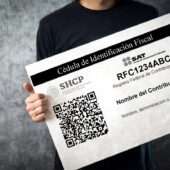Why a Foreigner Might Need to Consider Getting an RFC Number in Mexico
As a foreigner living, working, or investing in Mexico, understanding the local tax system is essential. One important component of this is the RFC number (Registro Federal de Contribuyentes), which is essentially the taxpayer identification number in Mexico. While you might assume that, as a foreigner, this number isn’t necessary, there are several compelling reasons why obtaining an RFC could be important for you.
1. Purchasing Property in Mexico
When you buy property in Mexico, especially as a foreigner, the government may require you to have an RFC number. Notaries handling real estate transactions may insist that you have one, as it is often required to finalize contracts and register the property under your name. Without an RFC, the process could be delayed or complicated.
Additionally, if you decide to sell the property in the future, an RFC number can help you reduce or potentially avoid certain taxes, like capital gains, by allowing you to deduct specific expenses. This could lead to significant savings.
2. Opening a Bank Account or Investment Account
Many Mexican banks and financial institutions now require an RFC number to open accounts, especially if they are linked to investment activities. If you are interested in growing your wealth through stocks, bonds, or local savings accounts, you will likely be asked to provide an RFC number. This is to comply with tax regulations, and it’s becoming a standard requirement for both residents and foreigners.
3. Starting a Business or Working in Mexico
If you plan to start a business or even work as a freelancer in Mexico, having an RFC number is essential. The RFC is needed for all tax filings, including income tax, and for issuing facturas (official tax receipts) to clients or customers. Without it, conducting business activities or complying with local tax obligations can be nearly impossible.
Even if you don’t own a business, some employers may request that you have an RFC to handle tax withholdings. This applies to full-time employees, contractors, and freelancers alike.
4. Renting Property for Income
If you own property in Mexico and decide to rent it out, you are required by law to pay taxes on your rental income. An RFC number is needed to declare this income with the SAT (Mexican tax authority). Without an RFC, you could face penalties or fines for non-compliance with tax regulations.
Furthermore, many renters, especially businesses and professionals, may request an official invoice (factura) for their rental payments. Without an RFC, you won’t be able to issue these invoices, which could limit your rental opportunities.
5. Avoiding Higher Withholding Tax on Investments
In certain cases, if you receive income from Mexican sources, such as interest from a bank account or returns on investments, the bank or institution may withhold a portion of your income for taxes. However, if you have an RFC number and are compliant with tax regulations, you might be eligible for a lower withholding rate or certain exemptions. Without an RFC, the withholding rate is typically higher, meaning you could lose more money to taxes unnecessarily.
6. Buying or Leasing a Car
When you purchase or lease a vehicle in Mexico, you may be asked for an RFC number, particularly if you finance the car. Financial institutions and dealerships are likely to require it, as it links you to the tax system and ensures compliance with local regulations.
Having an RFC can also simplify matters when insuring your vehicle. Insurance companies often ask for this information, and having it could speed up the process and allow you to choose from a wider variety of policies.
7. Applying for Mexican Residency
In some cases, having an RFC number can be beneficial, or even necessary, when applying for certain types of residency in Mexico, particularly those that involve work or business activities. An RFC number demonstrates that you are integrated into Mexico’s legal and tax system, which can support your case during the residency application process.
8. Paying Utility Bills
While not a strict requirement for personal use, some utility companies may ask for an RFC when setting up accounts, particularly if the bills will be in the name of a company or if the services will be used for commercial purposes. It’s a good idea to be prepared, especially if you own multiple properties or run a business.
9. Establishing Financial Credit in Mexico
For foreigners planning to stay long-term in Mexico, establishing a financial history is crucial for future endeavors like getting a loan, purchasing property, or opening investment accounts. Having an RFC is one of the first steps in building that financial record. Without an RFC, you may face difficulties when trying to access these financial services in the future.
10. Filing Taxes and Claiming Deductions
If you are legally obligated to pay taxes in Mexico, having an RFC number is necessary to file your tax returns. Even if your tax obligation is minimal, or you’re only filing to claim certain deductions, an RFC ensures you remain compliant with local laws and avoid any legal issues with the tax authorities.
Conclusion: The Importance of an RFC Number for Foreigners
While getting an RFC number may seem like an extra administrative step, it is often essential for foreigners living, working, or investing in Mexico. It ensures you comply with Mexican law, makes financial transactions smoother, and can protect you from potential penalties or legal complications down the line.
If you’re unsure about the process, it’s advisable to work with a legal or tax professional who can help you obtain your RFC number and navigate Mexico’s tax system with ease. By being proactive, you’ll be better prepared for any financial or legal matters that arise during your time in Mexico.


